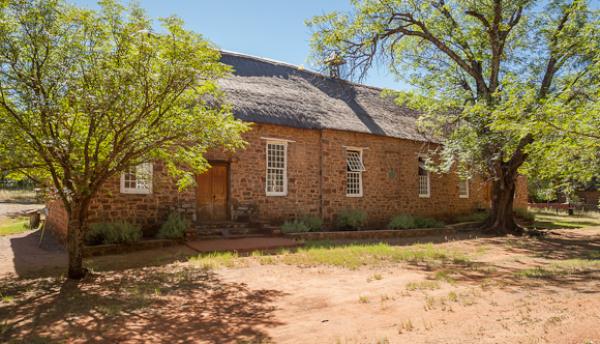

The Kuruman Mission was established by the London Missionary Society (LMS) in 1816 at Maruping near Kuruman where a town of about 10 000 Batswana were resident.
Robert Moffat, Scottish missionary and his wife Mary arrived in Kuruman from Scotland in 1820, and soon organised permission from Chief Mothibi to relocate to the present position at Seodin in the valley of the Kuruman River.
Not content with this, he was as the same time working on what would be his greatest legacy: the Setswana Bible. He taught himself Setswana, developed the orthography and (with a broader team) translated the Bible. Once this was done, he then proceeded to print it on a hand press - being the first entire Bible printed in Africa.
The press is still used for printing at the mission.
The great, fabled church at Moffat Mission was once the largest building on the high veld. David Livingstone saw the stone building when it was still new and said it was massive enough "to withstand a cannonading."
The church was built by Robert Moffat and Robert Hamilton with a band of local men.
The Kuruman Moffat Mission Trust was established in 1981 to restore and re-establish the old London Missionary Society (LMS) mission station at Kuruman.
It draws together the Anglican, Methodist, Presbyterian and United Congregational Churches, to provide a non-denominational resource for the churches and communities in the greater Kuruman area.
The Kalahari Desert School of Theology offers support for people studying theology by extension, usually preparing themselves for the ordained ministry. KDST provides a regional centre for the Theological Education by Extension College , arranges tutorials, provides a library and helps students to purchase books.
People studying with other institutions make use of the library and discuss their studies with people at the Mission.
Maphakela Centre provides accommodation for courses and meetings. It provides sleeping accommodation for 30 people, a hall, meeting rooms for small groups, a kitchen and dining room and meeting spaces outside.
There is a nominal entrance fee, payable at the Bookshop. On days when the Bookshop is not open, visitors are requested to drop their entrance fee into a "trust box".
Telephone: 0537121352 or 0537122645




